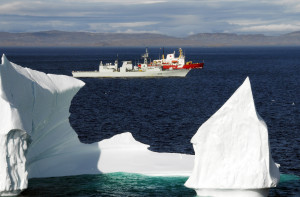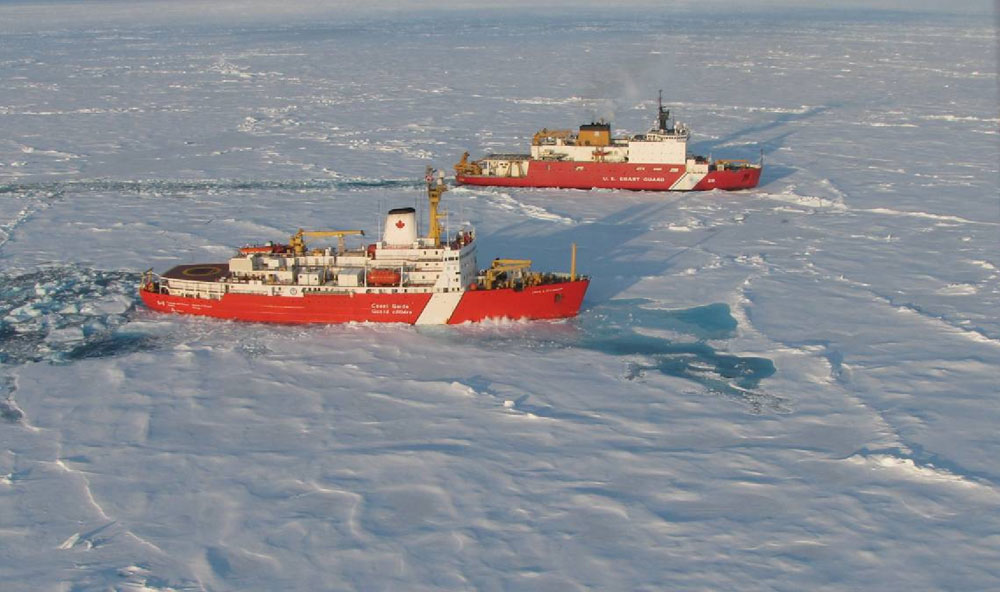The Federal Government’s contribution to Canada’s Search and Rescue (SAR) system incorporates resources and personnel from multiple departments. While the Royal Canadian Air Force is responsible for the aviation component of the SAR system, the Canadian Coast Guard (CCG) handles marine SAR. Unlike with aviation, the Federal Government does not have exclusive jurisdiction over Canada’s marine environment. With some exceptions, rivers, lakes and inland waterways fall under provincial control, while the Federal Government has jurisdiction over Canada’s Pacific, Atlantic and Arctic coastlines.
A relatively small percentage of the CCG’s existing fleet is focused on Arctic operations. Fewer vessels have dedicated SAR roles and are available on a standby basis.
However, the Canadian Coast Guard also operates in the Great Lakes, St. Lawrence Seaway and some other inland waterways. The situation is further complicated by the fact that maritime SAR activities involve not only specialised CCG assets, but also the Royal Canadian Mounted Police, Canadian Coast Guard Auxiliary and vessels of opportunity (which are legally obligated to provide assistance if possible). The Royal Canadian Navy also has an important secondary SAR role, particularly when CCG vessels are further away from the distress call or search area.
A relatively small percentage of the CCG’s existing fleet is focused on Arctic operations. Fewer vessels have dedicated SAR roles and are available on a standby basis. In 2012, CBC News reported that during the summer shipping season the CCG had six icebreakers available. According to the Department of Fisheries and Oceans in 2010, “the CCG has two heavy icebreakers, four medium icebreakers, and several other multi-taskable ice-capable vessels that can be assigned seasonally to Arctic ice operations.” Broadly speaking, the Auditor General of Canada’s 2013 Report commented that the CCG’s “lifeboats are adequate to meet search and rescue demands…” The Report also highlighted that the dozens of CCG SAR lifeboat vessels across the countries were deployed based on “periodic SAR needs analysis and an annual capability gap analysis.” The National Shipbuilding Procurement Strategy (NSPS) is going to be important for equipping the Canadian Coast Guard to face future challenges, both in the Arctic and elsewhere. The NSPS will involve the construction of a new heavy Polar Icebreaker and various smaller vessels for the CCG, including new SAR lifeboats.
The increasing accessibility of Canada’s Arctic is placing new pressures on the Federal Government’s SAR system. The growing amount of marine traffic in Arctic waters, including container and cruise ships, is of special concern to the Canadian Coast Guard. The CCG has historically had a very difficult mission since Canada’s Pacific and Atlantic coasts are some of the longest in the world. But the Arctic adds an even greater pressure to the CCG’s SAR responsibilities.

The Canadian Coast Guard has a network of dozens of stations across the country that serve as the base for a diverse fleet of vessels. In the Arctic, CCG Station Iqaluit serves each summer as the Marine Communications and Traffic Services Centre for the region. One example of future SAR challenges in the Arctic was the 2010 grounding of the Clipper Adventure (a cruise ship carrying 200 passengers and crew). The ship became stuck in Western Nunavut after hitting an uncharted rock. Though the incident was resolved without injury or loss of life, it highlights potential SAR problems to come. The grounding of the Clipper Adventure also brought up another major challenge the Canadian Coast Guard and Federal Government will face over the next several decades. As one media report noted in 2009, “only 10 per cent of the 7 million square kilometres of marine areas north of 60 degrees latitude is covered by modern charts.”



